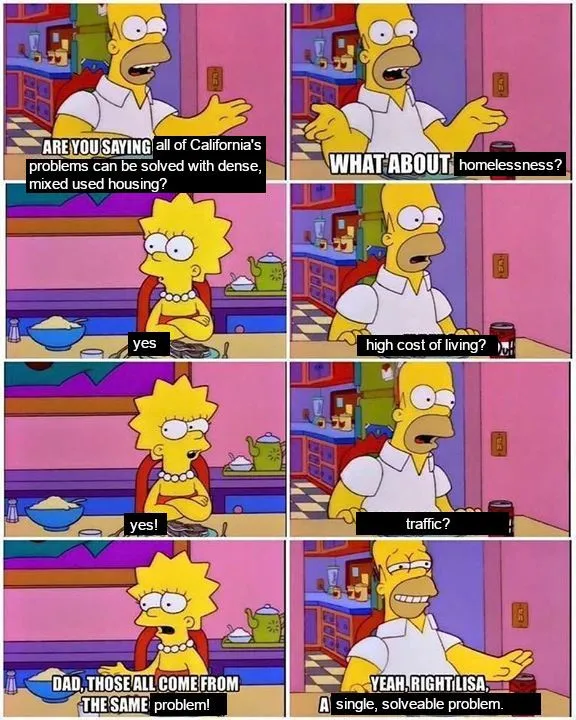this post was submitted on 04 Oct 2023
891 points (93.9% liked)
solarpunk memes
4619 readers
7 users here now
For when you need a laugh!
The definition of a "meme" here is intentionally pretty loose. Images, screenshots, and the like are welcome!
But, keep it lighthearted and/or within our server's ideals.
Posts and comments that are hateful, trolling, inciting, and/or overly negative will be removed at the moderators' discretion.
Please follow all slrpnk.net rules and community guidelines
Have fun!
founded 3 years ago
MODERATORS
you are viewing a single comment's thread
view the rest of the comments
view the rest of the comments

I think between their argument and your own, yours is the one in more need of citation. Which is more likely, that giving a house to everyone will solve homelessness or that some people have problems beyond just being homeless? He's not saying that it wouldn't help some people, he's just saying that there would still be some number of people who need help beyond this.
I mean, to me, "if someone gives them a house they won't be homeless" makes way more common-sense than "if you give someone a house they will not live in it"
but asked and answered:
edit to say: I want to get ahead of "gotchas!" like "it doesn't solve this problem of this one guy my mate's Da's landlord's daughter heard about through a crack in the wall about a homeless guy who set fire to his free housing!" as you can't legislate or plan for one whackjob who may not even exist.
It's not a gish gallop, it's a demonstration of a wide range of applications and environments has a net positive impact.
My original question was "which studies...?" (note plural) which sets the context for a reply with multiple sources
If you demand that anyone produces one, single study that solves the problem: impossible, regardless of topic, field and context. Nothing is provable by that standard.
Secondly, that one CNN article mentions that it was on a subset of people does not destroy the entire premise.
I am still waiting on counterexample studies, if you think providing several is beyond a reasonable ask, two would be acceptable.
We're not talking about beggars we're talking about the homeless. it's ironic to change topic while accusing me of logical fallacies.
I'm sorry you're not interested in how these ideas have actually been implemented and the level of success they show, but to me that's the only interesting part. It's all well and good saying "this solution will/won't work" but it's, to me at least, only the testing that matters.
As I just asked someone else: do you really believe that a single failure in a system means the whole thing isn't worth it? the example I used above is penicillin. As at least one person is allergic, and at least one person experiences no effect: does that mean that penicillin is considered ineffectual to bacterial infections? That seems silly to me, which is why I ask what your threshold for success is here.
You: you need to provide sources
Also you: I'm right, I don't need sources, you're moving the goalposts, ignore the fact that I have moved the goalposts.
Fuck you, and your bad faith bullshit.
Well, I asserted my opinion, asked for a counterexample, wasn't provided with any, was challenged to provide sources for my argument, did. In context I think its a reasonable response.
I am have yet to be linked to a single, non-hearsay argument.
ok here's my argument: most homeless people aren't like you describe, these kinds of programs benefit the vast majority and the tolerance of failure lies within expected bounds to believe the program is an overwhelming success (as evinced by the links above).
Although I fail to see how that couldn't have just been taken as read by any sensible reader.
You don't know how peer reviewed science works, and aren't worth talking to.
The fact that you think that providing housing doesn't work, when we have multiple countries worldwide that prove it does, just goes to show that you are a selfish bigot that doesn't want to solve the problem.
Pretty much yeah. This is what Finland did.
No it did not. Finland helped about half of the homeless people. And that's a very generous estimate because it's only those homeless people who are actually accounted for.
https://www.ara.fi/en-US/Materials/Homelessness_reports/Homelessness_in_Finland_2022(65349)#:~:text=At%20the%20end%20of%202022,a%20decrease%20of%20185%20people.
This is because they only select those who can be housed and are already part of the welfare system. It's also not just putting people in an apartment. There is still a lot of drug and debt counseling and mental help provided in the background.
And that's for the model country for the housing first approach.
Homelessness in Finland is bit different to most countries. You are counted as homeless even if you are living at friend's place or in an institution.
There are only around 300 actual homeless people. Everyone is given a place to sleep and live at.